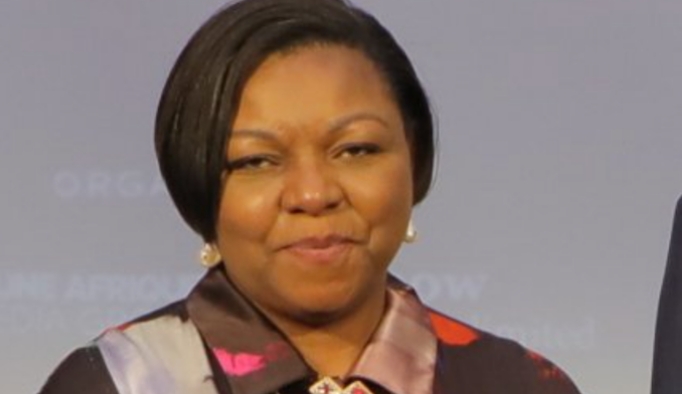Nigerian banker Bola Adesola, Standard Chartered’s senior vice-president for Africa, talks about the London-listed bank’s strategies and priorities – assuring that the hundred-year-old bank can still innovate.
Present in 25 countries in Africa and the Middle East – representing 9% of its total revenue – Standard Chartered is one of the oldest banks active on the continent. Last year, its revenues, down 8% year-on-year, reached $2.4bn in this zone, 11% of which was generated in Nigeria and 10% in Kenya, the second- and third-largest markets in the region behind the United Arab Emirates.
While its profit in the region fell by nearly 98% in one year to $13m as a result of the Covid-19 pandemic, the group is nevertheless optimistic, announcing in its latest annual report that it aims to remain “admired for our specialist servicing of the fast-growing trade and investment corridors across Asia,
Africa and the Middle East.” And plans to invest “in digital capabilities to help us become the leading banking platform in our footprint.”
When we think about fintech, we don’t usually think about banking institutions like Standard Chartered that have been around for so long. Do you consider it a misconception?
Bola Adesola: Many banks are not necessarily making the major systemic changes necessary to assist and take part in the emergence of the fintech ecosystem in Africa. But at Standard Chartered, we’re determined not to miss the big wave that’s coming along the line, because we believe in the revolutionary potential of fintech to transform financial services.
I think overall innovation ecosystems are what banks really should be looking at with fintech. One shouldn’t look only at “financing” alone as the venue for collaboration. What many fintech companies want – and I talk with many of them – is a platform that will enable them to achieve the scale they need. That is the collaboration we’re pursuing right across everything, from mergers and acquisitions to cash management etc.
Standard Chartered launched a structure called SC Ventures a few years ago. Would you tell us what it does?
About five years ago, Standard Chartered created the business unit SC Ventures to promote innovation and entrepreneurship within the organisation and outside, as well as alternative business models.
We have a SC Ventures hub in Nairobi because we see Africa as being very critical to what’s going to happen in that space. We’ve also launched – through a joint-venture – a cryptocurrency custodian service for institutional investors.
We are also very proud of Nexus, which is a white-label plug-and-play banking solution powered by Standard Chartered Bank. It’s a banking-as-a-service solution, so an e-commerce company for example would have Nexus as the back-end, and operate the front-end. We have also invested in Contour, which uses blockchain to track letters of credit both from the clients’ and the banks’ perspectives. And we have a partnership with Ant Group in Asia.
Many bankers across Africa express frustration that too many of the rules and regulations they have to comply with have been thought off and drafted abroad, in more mature markets. So they do not take into account the specificity of African markets, their levels of development and needs. What’s your take on this issue?
Banking is a regulated industry. Underlining our traditional role of financial intermediation is our duty as risk takers and risk managers. That is fundamental to what we do. When I started banking over 30 years ago, a lot of the risk management activity focused on credit, liquidity and market risks. But today risk management is more robust and takes into account the whole spectrum of enterprise risk: credit and market as before, but also operational and legal risks, business continuity and environmental risks, compliance and cyber risks.
The regulators must design the rules and the framework that will protect the depositors. It was breaches in regulation that led to some of the crises we’ve had, whether in Nigeria, where it was necessary to create a “bad bank”, the Asset Management Corporation of Nigeria, to deal with troubled banking assets, or with the subprime crisis in the US.
Of course, sometimes some of these regulations are not really suited to optimise our markets and might be more aligned with “advanced market” standards. But, first, technology is already changing that “distance”. And secondly, these policies have been very positive and impactful.
If you look at the Basel framework, for example, for capital adequacy ratios, stress testing and so on. Apart from the drawback and the pressure of compliance, these policies have saved many banking systems across Africa because they’ve become more resilient against global crises.
Furthermore, these policies have been important in strengthening our banking environment when it comes to reducing and punishing illicit financial flows, and the financing of illegal activities and terrorism.
In the end, I think that with the African Continental Free Trade Area (AfCFTA) agreement, the collective voice of African countries will emerge and create a critical mass that will enable us to effectively craft regulations that will benefit Africa and then push against those that may not benefit us.
And, of course with an African – Ngozi Okonjo-Iweala – at the head of the World Trade Organisation, who has global experience, we can hope that even if her focus, obviously, is going to be on global issues, she would understand more the issues relating to the continent and what needs to be done on trade regulations for us here.
Talking of regulations, there has been a lot of controversy regarding the activities of many lending applications, which have become popular in a lot of African countries. What can be done to curb or regulate their operations?
Online lenders are definitely good news because they help with financial inclusion, but all financial services must be effectively regulated. When that’s not the case, there are significant risks for customers.
We have to recognise that the pandemic has actually opened up the underbelly of how the financial circumstances of maybe hundreds of millions of people have declined. This has contributed to an increase in the operations of online lending apps, even when the rates of interest they charge are particularly high, sometimes as much as 20-30-40% a month!
There are several important issues here. First, in many cases those apps are flouting the principles of fair personal data management, using personal data information (calls and SMS records, frequency of bank alerts and airtime use, social media, etc.)
The second issue is recovery. People who have to borrow at these kinds of rates often find it a challenge to repay in time. And often, online lenders have resorted to unconventional methods of recovery (shaming on social media for instance). I think it’s very important that the regulatory agencies intervene to ensure the protection of customers. In some countries – like Nigeria, Kenya and especially Ghana – there have been some positive steps in that direction.
Finally, advocacy and public pressure can contribute to create a more transparent ecosystem for these lending apps. For instance, Google banned from its platform the apps that offer loans that have to be repaid in less than two months. So the court of public opinion and the private sector coming together can help ensure that the developers and the lenders don’t use their platforms to promote some of these unfair practices.
For the past several years, a number of international banks have left Africa. Barclays is one of them. But others like France’s BNP Paribas and BPCE have significantly reduced their footprints on the continent. Standard Chartered – and Societe Générale – didn’t. Why?
A lot of it is dependent on your business model, your strength, the products you’re offering and whether there’s a need for that product.
Even though we’re headquartered in the UK, we’re actually an emerging-markets bank. We focus a lot on Asia, Africa and the Middle East, providing financing to facilitate trade and commerce within emerging markets. We’ve been on the continent for more than 100 years and our roots are very much African.
What are the considerations for us staying or leaving? It’s easy for some to take a short-term view and say “things are shifting”, “some of these economies are not necessarily politically stable”, etc.
First, we see an improving relative risk and a shift towards Africa from the already shaky economic and geopolitical political fault lines in places like the USA, China and Europe.
Secondly, there is a remarkable regional resilience, even in the face of Covid-19. And the recovery from the pandemic, in Africa, will be probably much quicker than we thought, quicker than after the financial crisis in 2008 or even the commodity crash in 2014.
Finally, there are the long-term structural trends. One is the demographic dividends on a young, urban and dynamic continent which we must exploit. Another is the technology and innovation dividend. A third one is to leverage the entrepreneurial, tech-oriented and optimistic businesspeople in Africa, to see how that drive for business and for entrepreneurship can be delivered through technology. The fourth trend is greater integration in Africa, especially the AfCFTA.
In that case, how does Standard Chartered plan to make the best of these prospects?
One opportunity we see is scaling-up. We launched the very first ever fully digital bank in the history of the group in Africa, when I was CEO of Standard Chartered for Nigeria and West Africa. Would we have launched that digital bank in an African country if we didn’t believe that we needed to make that quantum leap in Africa as well ? This digital-banking platform has been rolled-out in Africa and is being rolled out in Asia. Similar opportunities exist in areas like healthcare, education, e-commerce etc. And what is important is that regulators and governments are supporting us. It may be slow, but it’s happening.
There are also interesting prospects in drilling down into and harnessing big data because that’s what will help us in accelerating digital transformation across Africa, and in developing public-private partnerships to bridge the infrastructure gap and in developing countries’ regional value chains and competitiveness – which AFCTA is also going to help with.
You’ve mentioned the support you receive from the public authorities. Can you tell us a bit more about how Standard Chartered works with governments in Africa ?
When you’ve been in the country for more than a century, you get to know and to be trusted also by the government. So we are a sovereign ratings adviser to the majority of the countries on the continent. Since we are invested in the countries, we’re best positioned to understand the nuances of the country and to help the country present itself to the ratings agencies, international markets etc. And also our credentials even in terms of supporting the countries in innovative finance is impeccable.
Because we’re in the country, we’re better able to sell or market eurobonds or any other form of multilateral investment. Many African countries face significantly high levels of debt, and we’ve already started delivering solutions like innovative blended finance. We’re looking at asset recycling and other forms of sustainable finance.
The “title” of the biggest international bank in Africa is a hotly contested one. What is Standard Chartered’s current footprint in Africa and your focuses of operation?
While some who said they were the “biggest” have left, we’ll continue to grow and we’re exporting a lot of our African experience and developments into the group. A lot is happening for us, and the outlook is quite positive in the long term. However you look at it, we’re the largest international bank in Africa, with a presence in 16 countries. We have full-service banks in all of them except maybe one or two countries where we offer corporate business. And overall, we’re operating in a total of 37 African countries, that’s important. For instance, we are not present in Senegal in terms of a full-service bank, but we make more earnings out of Senegal than in one or two of the smaller countries in the region where we have a full-service presence.
Our longevity and consistency in serving the African continent, I think is a differentiating factor. And because of our longevity in these countries, we’re a household name and we can leverage our network and expertise (financial, industrial, operational…). Africa remains a significant contributor to regional earnings. And our clients see us as the go-to bank because of our links between Africa, the Middle East and Asia.
Our play on that corridor remains quite significant. We have dedicated “corridor bankers”, focusing on driving business whether from Mauritius to India, Kenya to China, Ghana to Malaysia. It is not incidental to our businesses but is integrated into our objective of driving commerce and trade in emerging markets. So that is a major differentiator.
These are things which are unique to us as a bank, and I can’t name any other bank that has those credentials and is as invested on the continent as a Standard Chartered is. We are walking the talk.
Source: The Africa Report









